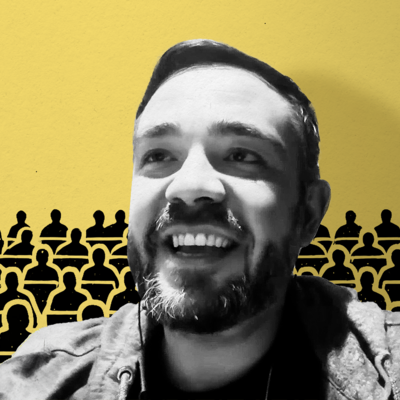
TL;DR: Today we’re releasing a new episode of our podcast AI & I. I go in depth with Alex Wieckowski, the reader, writer, and podcaster better known as Alex & Books. We get into how to use AI to read, ways to rediscover your childhood love for books, and how technology might disrupt reading. Watch on X or YouTube, or listen on Spotify or Apple Podcasts.
Alex Wieckowski is on a mission to make you fall in love with reading again—and he thinks AI can help.
Alex, who writes a newsletter that captures lessons from books he’s read and tips to become a better reader, Alex & Books, is a creator with over 1 million followers across social platforms. He’s also the author of a book of quotes that will inspire you to read more, Learn to Love Reading.
We spent an hour talking about how Alex uses AI to be a smarter reader, and we tested out a few strategies live on the show, including:
- prompting ChatGPT to recommend books that will help me lead a creator-run business better,
- understanding the deeper themes in Hermann Hesse’s novel Siddhartha with large language models, and
- using AI to create an actionable strategy for Alex to build a course based on the frameworks in Alex Hormozi’s business strategy book $100M Offers.
Alex clued me into what he’s learned about developing a good reading habit, and his best advice on how to reignite your passion for books. We also discuss Alex’s predictions on how companies like Neuralink, which make use of a brain-computer interface—a technology that allows users to control external devices through brain activity—will change the future of reading and books. Here’s a link to the transcript of this episode.
This is a must-watch for book lovers, people struggling to finish books, and anyone who wants to take their reading to the next level with AI.
Watch on X or YouTube, or listen on Spotify or Apple Podcasts.
(If you’re interested in knowing more about how AI changes the way we learn and read, I recently got access to ChatGPT’s new Advanced Voice Mode feature and recorded a video on how you can use it to maximize your reading. Watch on X or YouTube.)
If you want a quick summary, here’s a taste for paying subscribers:
How to use AI to be a smarter reader
During his reading sessions, Alex prefers an analog approach: armed with just a physical book and a pen to jot down questions or ideas that he typically explores with an LLM later on. These are the specific ways in which he’s integrated AI into his reading:
- LLMs to help you find the perfect conversation starter. If someone mentions an unfamiliar book to Alex, he uses AI to summarize it so he can understand their interests and have meaningful conversations. He describes his approach: “So, if we were at a party and you mentioned that book… I'd literally just go to the bathroom, open up ChatGPT and be like, ‘Hey, can you summarize this book for me in 500 words?’”
- Find your next read with AI. Alex prompts AI with the name of a book that he’s enjoyed reading and uses it to find similar ones, noting that the more context you give the LLM, the better the recommendations will be. He thinks of AI as the “ultimate librarian” that can give you great book recommendations because it has “read through thousands, if not millions of books.”
- Use AI to get tailored recommendations. Alex suggests using AI to get personalized book recommendations to solve a specific problem that you’re experiencing, or to help you reach your self-improvement goals. His prompt to the LLM is usually along the lines of, “I'm currently struggling with a pain point, could you recommend three books that will help me solve this problem?”
- ChatGPT as the omnipresent study buddy. Alex uses AI as a personal study buddy to read complex books, prompting LLMs to help him understand deeper themes in simple terms, and to keep track of the relationships between different characters. “There's a lot of books I want to explore, but I know they're beyond my expertise or knowledge, so I need someone to kind of teach me what the book's about,” he explains.
- Turn insights into action with AI. While reading nonfiction books, Alex finds it useful to list his key takeaways, and then prompt ChatGPT to explore their practical applications in his life. “For example, the Alex Hormozi book recently has that whole Grand Slam offer—[basically,] how to make a compelling offer—so then I'll ask ChatGPT, ‘How can I apply this to something I'm trying to sell?’” he says.
- Use AI to read more deeply. Alex uses AI to identify the biggest influences in the lives of his favorite authors. He finds that the LLMs are good at answering the question of who your “hero’s heroes” are, which can provide deeper insight into their ideas and thought processes.
- AI will make sure your next book is worth the read. Alex thinks asking LLMs to generate a summary of a book before buying it can help readers make informed purchase decisions. “Let’s say you’re in a bookstore and you're not sure if this book has the lessons you're looking for, you could ask AI, ‘Hey, can you write a 500-word summary?’... to be able to identify if it has the lessons you're looking for.”
Insights from Alex’s personal reading habit
These are a few valuable things Alex has learned about reading:
- Physical books will boost your memory. Alex favors physical books over e-readers, valuing their ability to improve memory retention and provide a break from technology. “There's studies that talk about how if you read a physical book, you remember more of what you read because you remember, ‘Oh, that chapter was on the left side of this page’…versus on the Kindle book, everything was the same,’” he explains.
- Align the books you read with your priorities. The rule Alex lives by when it comes to deciding whether to buy a new book is “read it when you need it.” “Think about what's the biggest priority in your life and then focus on reading books in that section,” he advises, explaining that books about copywriting are relevant for him lately because he’s in the process of rewriting the copy for his course.
- Cap the number of books you read at once. Alex is typically reading three different books at a time: a serious book to inform himself, a fun book for entertainment, and an audiobook when he’s on the go. He thinks having a limit on the number of books he reads is useful because otherwise you’re in danger of falling prey to “shiny new object” syndrome and “starting 10 different books and never getting through any of them.”
How to rediscover your love for books
If you’re struggling to finish that book you’ve been reading for too long, you are not alone. Even Alex sometimes takes longer than he’d like to finish a book, a current example being Peter Attia’s book about the science of longevity, Outlive. While everyone enjoys reading picture books as children, and series like Harry Potter and A Series of Unfortunate Events as young adults, he thinks that being forced to read classic English class books in school often “kills” their “joy for reading.” Here are his tips for everyone who wants to find joy in reading again:
- Accelerate your reading habit with short books. “Pick up short books because they're easier to read, easier to finish, and help you build momentum.”
- Fit reading into your routine. “You either want to focus on combination or prioritization—either you want to make time ahead of other activities you're already doing, or combine reading with an existing activity. So for example, you know, if you already work out a lot, just listen to an audiobook…or before you put on Netflix, read for five or 10 minutes.”
- Discover the book that turns you into a reader. “Everyone [who] thinks they're not a reader, they just haven't found the right book…hopefully they stumble upon a book that kind of catches their eye…that's the unlock—once you realize you're done with school, no one's gonna assign you these books, you're not being tested on these books, you can read anything you want, I think that kind of opens up the world to them.”
Alex’s take on the future of books
I asked Alex how our reading experience might change as technology jumps leaps and bounds forward. These are his predictions:
- Books have an enduring legacy. Alex thinks that books will stay relevant, drawing from their millenia-long history and the Lindy effect, according to which the longer something has been around, the longer it will persist. “You have the Lindy aspect of it where books have been around for thousands of years, and that means they'll probably be around for another thousand years,” he says.
- The final frontier of books might draw close. All the same, Alex acknowledges that transformative technologies, like a brain-computer interface, can disrupt the future of books. “Who knows with Neuralink, if you just download a book into your brain—do you even need to read it? I think books will be useful until that point in time,” he explains.
What’s on Alex’s bookshelf
A book I’ve been reading recently is Children of Memory, which is part of author Adrian Tchaikovsky’s science fiction series, Children of Time. These are the titles currently on Alex’s bookshelf:
- Never Enough: From Barista to Billionaire by Andrew Wilkinson
- $100M Offers by Alex Hormozi
- Siddhartha by Hermann Hesse
You can check out the episode on X, Spotify, Apple Podcasts, or YouTube. Links and timestamps are below:
- Watch on X
- Watch on YouTube
- Listen on Spotify (make sure to follow to help us rank!)
- Listen on Apple Podcasts
Timestamps:
- Introduction: 00:00:34
- Choose physical books over e-readers to boost your memory: 00:01:36
- Alex’s take on how long books will stay relevant: 00:02:54
- Prompt ChatGPT to find your next read: 00:07:40
- Articulating Dan’s taste in books with AI: 00:13:50
- Use AI to find books tailored to solve your problems: 00:15:46
- How to use AI as a personal study buddy: 00:33:32
- Prompt LLMs to turn insights from books into actionable strategies: 00:41:19
- What Alex’s rule around buying a new book is: 01:02:10
- Alex’s advice for anyone who feels like they don’t have time to read: 01:16:36
What do you use AI for? Have you found any interesting or surprising use cases? We want to hear from you—and we might even interview you. Reply here to talk to me!
Miss an episode? Catch up on my recent conversations with LinkedIn cofounder Reid Hoffman, a16z Podcast host Steph Smith, economist Tyler Cowen, writer and entrepreneur David Perell, founder and newsletter operator Ben Tossell, and others, and learn how they use AI to think, create, and relate.
If you’re enjoying my work, here are a few things I recommend:
- Subscribe to Every
- Follow me on X
- Subscribe to Every’s YouTube channel
Thanks to Rhea Purohit for editorial support.
Dan Shipper is the cofounder and CEO of Every, where he writes the Chain of Thought column and hosts the podcast AI & I. You can follow him on X at @danshipper and on LinkedIn, and Every on X at @every and on LinkedIn.
The Only Subscription
You Need to
Stay at the
Edge of AI
The essential toolkit for those shaping the future
"This might be the best value you
can get from an AI subscription."
- Jay S.
Join 100,000+ leaders, builders, and innovators

Email address
Already have an account? Sign in
What is included in a subscription?
Daily insights from AI pioneers + early access to powerful AI tools








